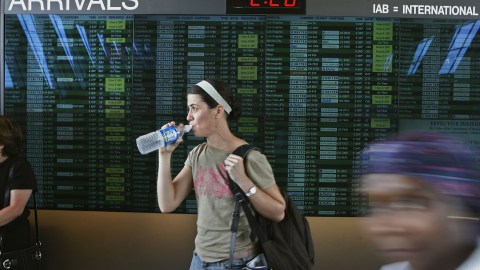Your Allowed Carry-On Luggage Is About to Get Smaller

Air travel is frustrating. If it’s not the TSA, then it’s the airlines, and if it’s not them, then it’s usually other people that make us bow our heads, close our eyes, and rub our temples slowly. So, it’s with a heavy heart that I must report traveling for international flyers is about to get more interesting.
International Air Transport Association (IATA) just handed down new size recommendations for carry-ons, suggesting a bag size of 21.5 x 13.5 x 7.5 inches is “optimal.” The Washington Post‘s Ana Swanson and Darla Cameron report that this is about “21 percent smaller than the size currently permitted by American Airlines, Delta Air Lines, and United Airlines.”
Of course, this recommendation is not welcome news for frequent flyers. But IATA Senior Vice President Tom Windmuller said in a press release that this suggestion is “designed to make things easier for everybody.”
“A size of 55 x 35 x 20 cm (or 21.5 x 13.5 x 7.5 inches) means that theoretically everyone should have a chance to store their carry-on bags on board aircraft of 120 seats or larger,” the press release read.
Indeed, a lot of things would be easier in airports if everything functioned under ideal operating conditions. But the human factor often gets in the way. You may not realize this, but there’s a fast-boarding algorithm that’s been developed. Why don’t we use it? Because people can’t follow directions.
Frequent international flyers may be a bit upset, but it’s all for the greater good. Windmuller’s last words in the press release were ones of empathy:
“The development of an agreed optimal cabin bag size will bring common sense and order to the problem of differing sizes for carry-on bags. We know the current situation can be frustrating for passengers. This work will help to iron out inconsistencies and lead to an improved passenger experience.”
Read more at The Washington Postand IATA.
Photo Credit: Getty Images




